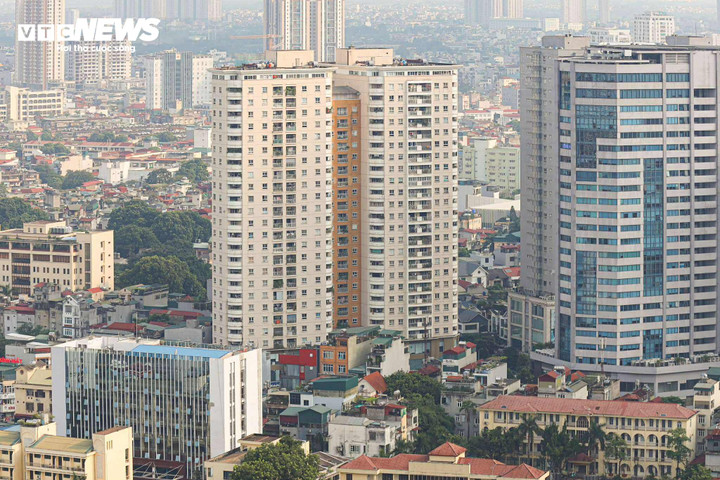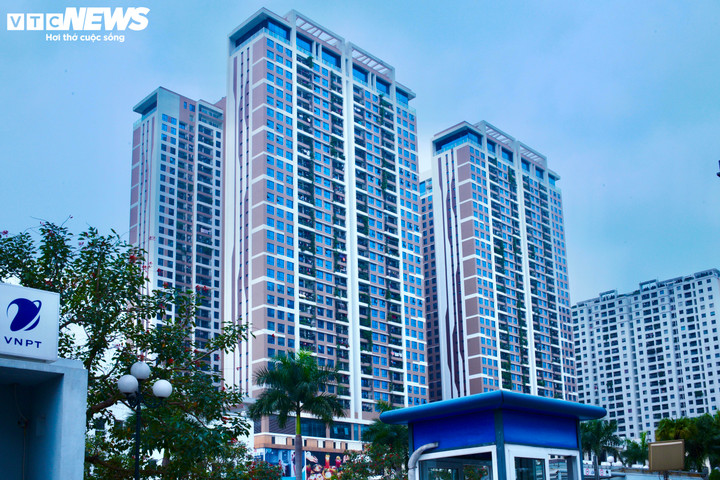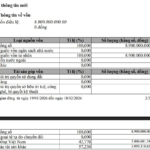Mr. Pham Duc Toan, CEO of EZ Real Estate Investment and Development JSC (EZ Property), stated that the sharp rise in Hanoi apartment prices is primarily due to limited supply, which is concentrated in the high-end segment. However, Hanoi recently resolved bottlenecks for 298 commercial housing projects. Moving forward, numerous residential projects are expected to break ground. Additionally, the government is focusing on robust development of social housing. As a result, housing supply is projected to surge between 2026 and 2027.
“The key to addressing housing prices is increasing supply. By 2026–2027, as supply significantly rises, apartment prices will decrease. When supply is no longer dominated by a few major players, market competition on pricing will benefit genuine homebuyers,” he remarked.

Apartment prices may have peaked and are set to cool down. (Illustrative image: Minh Duc)
Ms. Do Thu Hang, Senior Director of Research and Consulting at Savills Hanoi, also forecasted that in Q4/2025, the market will welcome a new supply of 8,900 units, primarily mid-range apartments. From 2026 onward, supply is expected to be more abundant.
According to her, there are three reasons for the cooling of apartment prices. First, the supply of apartments is being supplemented more extensively. In Hanoi alone, the city has approved 148 projects covering over 840 hectares, piloting commercial housing projects through land-use rights agreements.
Furthermore, the acceleration of old apartment renovations will create a substantial supply, especially with new regulations allowing additional floors during renovations.
Third, numerous social housing projects have been expedited, and investment policies are more attractive than before.
Mr. Nguyen Anh Que, Chairman of G6 Group, noted that the rise in apartment prices, alongside increased input costs, stems from businesses grappling with excessive legal procedures, prolonging timelines and failing to meet demand.
Thus, if these bottlenecks are swiftly resolved and the supply of affordable housing increases, apartment prices could adjust downward. Mr. Que cited historical examples, such as during 2008–2010, when apartment prices ranged from 50 to 70 million VND/m². However, by 2011–2013, with the emergence of low-cost housing projects averaging 11–15 million VND/m², prices declined.
Mr. Que predicts that if this pattern repeats, housing prices could decrease from 2026. This is because residential projects, particularly social housing, will finalize procedures, boosting supply within a year and cooling prices.
Ms. Duong Thuy Dung, Senior Director at CBRE Vietnam, also noted that apartment prices cannot rise indefinitely; they will stabilize once they reach the “tolerance threshold” and affordability limits of homebuyers.
In reality, Ho Chi Minh City apartment prices, after a continuous rise from 2017 to 2019, plateaued in 2022. “HCMC apartments have reached a level that residents can no longer afford,” Ms. Dung observed. Specifically, the average price per apartment is 100 million VND/m². Including affordable projects, the average is 65 million VND/m², with peaks exceeding 200 million VND/m².
Similarly, in Hanoi’s apartment market, prices will continue to rise until they reach the 100–200 million VND/m² threshold, at which point they will stabilize.

Experts believe a comprehensive approach is needed to cool apartment prices. (Photo: Cong Hieu)
Naturally, price increases will depend on location and project quality. Projects currently priced at 70 million VND/m² will continue rising until they reach 100–120 million VND/m².
Projects priced at 30–40 million VND/m² may rise to 50–60 million VND/m², depending on apartment quality and developer reputation.
In the previous cycle, the HCMC apartment market took five years to peak, so Hanoi’s apartment market will likely follow a similar timeline for price increases.
What Can Be Done to Lower Apartment Prices?
To expedite the reduction in apartment prices, Mr. Nguyen Van Dinh, Chairman of the Vietnam Real Estate Brokerage Association (VARS), suggests accelerating the progress of social housing projects. Authorities should proactively regulate supply by efficiently using planning tools, allocating additional clean land to enable investors to launch social housing projects immediately upon planning approval.
Long-term stabilization of apartment prices and housing products requires robust government involvement. This includes continued development of transportation infrastructure, reducing travel times from satellite areas to city centers, as supply from peripheral areas will help lower housing prices.
Mr. Le Hoang Chau, Chairman of the Ho Chi Minh City Real Estate Association, suggested that the government establish a standardized investment and construction process for commercial housing projects, defining timelines for administrative procedures. This would encourage agencies and localities to minimize excessive requests for additional documentation, thereby shortening administrative processing times.
Additionally, state agencies should focus on resolving legal bottlenecks for real estate projects to increase housing supply. Boosting supply will stabilize prices through market supply-demand dynamics and competition.
Mr. Chau also urged real estate corporations and businesses to reduce housing prices, lower profit expectations, avoid price inflation, increase discounts, and implement promotional policies to stimulate market demand, generate cash flow, and enhance liquidity.
Real estate businesses should shift focus to affordable housing segments, aligning with residents’ income levels, and participate in social housing development to access preferential credit packages.
Mr. Pham Duc Toan believes the key to cooling real estate prices lies in social housing urban areas on the outskirts of the capital. Once these projects are completed, Hanoi housing prices could drop by 30–40% from current levels.
Which Investment Channel Will Shine Next: Gold, Real Estate, or Stocks?
The three major investment channels are entering distinct phases. Gold is forecasted to continue its upward trajectory in the medium to long term, while real estate maintains short-term vibrancy but carries potential risks from 2027 onward. Meanwhile, the stock market is showing signs of bottoming out, paving the way for a more unified upward trend.
Sleepless Nights Securing a 60m² Hanoi Apartment for Over 1 Billion VND
From the afternoon of November 16th, hundreds gathered at the registration area for the CT3 social housing project in Kim Chung urban area, Thien Loc commune (Hanoi), securing their spots to submit applications on the morning of November 17th.
Ending the Chaos: How to Stop Thousands from Scrambling and Relying on Luck to Buy Social Housing
According to experts, ending the “lottery-like” scenario of purchasing social housing requires the simultaneous implementation of multiple solutions. These include increasing the supply of affordable homes, expanding new urban spaces, and limiting the number of applications to ensure fair competition.




















